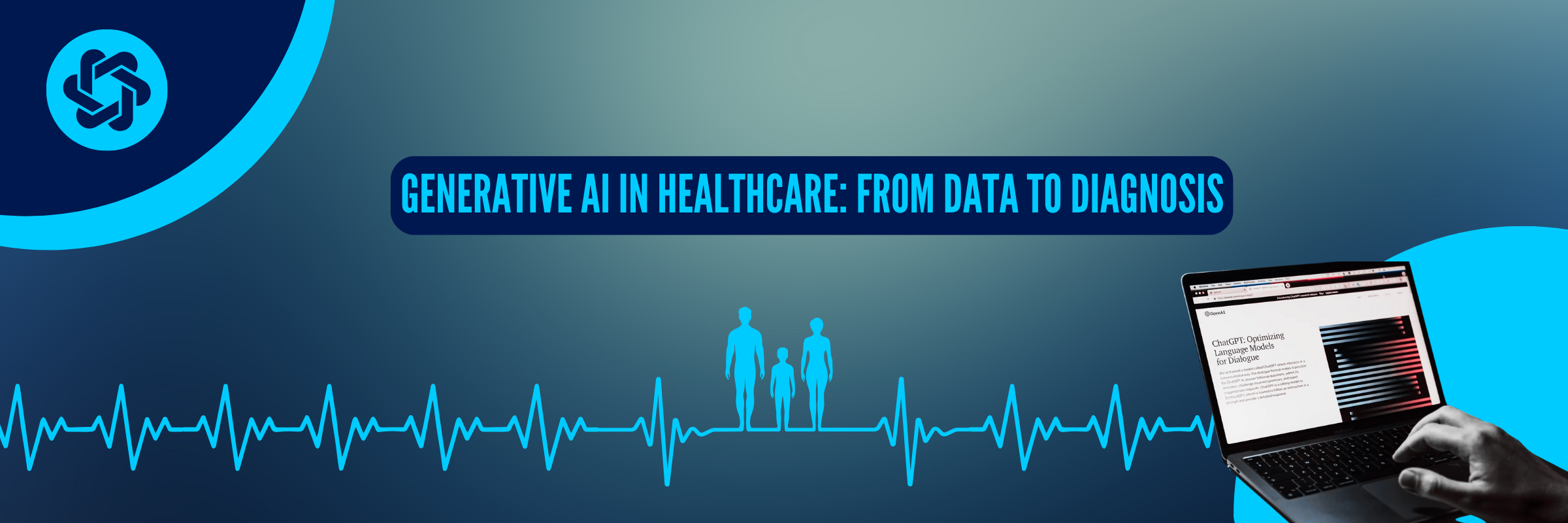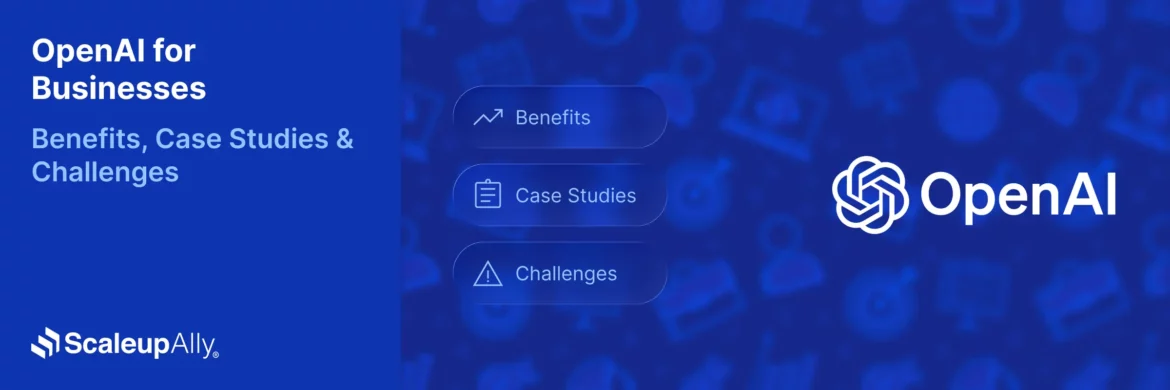
Generative AI in Healthcare: From Data to Diagnosis
Manu Jain | May 10, 2024 , 14 min read
Table Of Content
Did you know that healthcare organizations today are being challenged by a massive amount of data? The volume of healthcare data is soaring. With the widespread use of electronic medical records, insurance claims and other sources, more and more information about our health gets collected every day.
As per RBC Capital Markets, the healthcare industry now generates approximately 30% of the world’s data volume. That’s a massive amount of data generated every day, and the healthcare industry is turning to artificial intelligence (AI) to help make sense of it all.
AI is making a significant impact in diagnosis, providing doctors and healthcare professionals with valuable insights to improve patient care.
In this article, we will explore the world of generative AI in healthcare, from its role in data analysis to its ability to diagnose complex diseases. We’ll dive into the latest advancements in generative AI, its potential benefits, and the challenges that still need to be overcome to realize its potential in healthcare fully. By the end of this article, you can expect to understand better how generative AI is revolutionizing healthcare.
Understanding Generative AI
Generative AI is a type of artificial intelligence that can create new data or information based on a given set of parameters. Essentially, it involves using algorithms to generate new content rather than simply classifying or processing existing data. This makes it particularly useful in healthcare, where large sets of complex data need to be analyzed to identify patterns and diagnose diseases.
Generative AI works by using neural networks to learn patterns in data and then using that knowledge to generate new data.
For example, it could be used to create new medical images based on existing ones, or to generate new patient data based on existing patient records. Doing so can help doctors and healthcare professionals identify new trends or patterns in the data that might not have been immediately apparent.
Applications of Generative AI in Healthcare
Generative AI has a wide range of potential applications in healthcare, from drug discovery and development to patient diagnosis and treatment. Here are some of the key areas where generative AI has the potential to make a significant impact:
1. Chatbots for Patient Engagement
Chatbots can provide personalized interactions with patients, helping them schedule appointments, receive medication reminders, and get answers to common health questions. Imagine a chatbot that helps you schedule doctor’s appointments and sends you reminders for taking medication, similar to how a virtual assistant helps you manage your daily tasks.
2. Image Recognition for Diagnostics
Generative AI can analyze medical images, such as X-rays or MRIs, to assist doctors in diagnosing conditions like fractures or tumors more quickly and accurately. Think of a scenario where AI analyzes a skin lesion photo you upload, providing you with an initial assessment and advice, similar to how facial recognition tags your friends in photos on social media.
3. Text Generation for Reporting
AI-generated reports can summarize patient data, reducing the time spent on documentation and allowing healthcare providers to focus more on patient care. Picture a system that automatically generates a summary of your medical visit, including your symptoms, diagnosis, and treatment plan, similar to how predictive text completes your sentences.
4. Automated Data Analysis
AI algorithms can analyze large datasets to identify trends and patterns, helping healthcare professionals make more informed decisions and improve patient outcomes. Consider a tool that analyzes your fitness tracker data to provide personalized health recommendations, similar to how online platforms suggest products based on your browsing history.
5. Virtual Health Assistant
Virtual assistants can inform patients about their health conditions, treatment options, and lifestyle recommendations, improving patient education and adherence to treatment plans. Envision having a virtual assistant that helps you understand your lab test results and suggests lifestyle changes to improve your health, similar to how a personal trainer customizes workouts for you.
These applications demonstrate how Generative AI revolutionizes healthcare by improving patient care, streamlining processes, and advancing medical research.
5 Key Benefits of Using Gen AI in Healthcare
Using generative AI in healthcare can offer many benefits, making it an attractive option for healthcare professionals. Let us take a look at 5 such key benefits:
1. Improved accuracy in diagnosis
Generative AI can analyze large amounts of data to identify patterns and help healthcare professionals make more accurate diagnoses. This can lead to better patient outcomes and improved quality of care.
2. Increased efficiency
Generative AI can automate many tasks that would otherwise be performed manually, freeing up healthcare professionals to focus on patient care. This can lead to increased efficiency and lower costs.
3. Personalized care
Generative AI can analyze patient data to provide personalized treatment recommendations, improving patient outcomes and satisfaction.
4. Improved patient engagement
Generative AI can provide personalized interactions with patients, helping them stay engaged in their healthcare and improving adherence to treatment plans.
5. Virtual Health Assistants
AI-powered virtual assistants can provide patients with 24/7 access to health information, answer common medical questions, and offer guidance on managing chronic conditions, thereby enhancing patient engagement and education.
Need Scalable AI Solutions for Healthcare?
Explore AI platforms integrating with health records for seamless, scalable deployment.

Leveraging Data in Healthcare
Data is rapidly becoming the backbone of healthcare, from electronic health records to telemedicine. As the industry continues to digitize, vast amounts of data are being generated, offering unprecedented opportunities to improve patient care and outcomes.
However, the challenge lies in making sense of this data and using it effectively to drive innovation.
Let’s explore how healthcare providers are leveraging data to improve patient care.
Data Integration and Analysis
Data integration plays a crucial role in healthcare, as it involves combining and managing data from various sources, such as electronic health records (EHRs), medical imaging systems, and wearable devices. This integrated data can then be analyzed to extract meaningful insights that can inform decision-making and improve patient outcomes.
Consider a scenario where a patient’s EHR data, including their medical history, lab results, and prescription records, is integrated with data from their fitness tracker.
By analyzing this combined dataset, healthcare providers can comprehensively understand the patient’s health status and tailor their treatment plan accordingly.
Data analysis in healthcare involves using advanced analytics techniques, such as machine learning and predictive modeling, to uncover patterns and trends in the data. These insights can help healthcare professionals identify at-risk patients, predict disease progression, and personalize treatment plans.
Machine learning algorithms can analyze medical imaging data, such as X-rays and MRIs, to assist radiologists in detecting abnormalities and diagnosing conditions like cancer at an early stage. This can lead to more timely and accurate diagnoses, improving patient outcomes.
Challenges and Considerations
While data integration and analysis offer significant benefits, healthcare organizations must navigate several challenges and considerations to ensure the success of these initiatives:
1. Data Privacy and Security
Healthcare data is highly sensitive and must be protected against unauthorized access and breaches. Organizations must comply with regulations such as the Health Insurance Portability and Accountability Act (HIPAA) to safeguard patient information.
2. Data Quality and Integrity
Ensuring the accuracy and reliability of data is essential for meaningful analysis. Healthcare organizations must establish data governance frameworks and processes to maintain data quality and integrity.
3. Interoperability
Healthcare systems often use different standards and formats for data storage and exchange, leading to interoperability challenges. Efforts to standardize data formats and improve interoperability are essential for effective data integration.
4. Resource Constraints
Implementing data integration and analysis initiatives requires significant resources, including technology, expertise, and infrastructure. Healthcare organizations must carefully plan and allocate resources to support these initiatives.
By addressing these challenges and considerations, healthcare organizations can harness the power of data to drive innovation, improve patient outcomes, and transform the healthcare industry.
Ethical and Regulatory Considerations
As healthcare organizations increasingly rely on data-driven technologies to improve patient care and outcomes, addressing the ethical and regulatory considerations that come with these advancements is essential.
From ensuring patient privacy to complying with regulatory requirements, healthcare providers must navigate a complex landscape to uphold ethical standards and regulatory compliance. Here’s a closer look at data-driven healthcare technologies’ ethical implications and regulatory landscape.
Ethical Implications
1. Patient Privacy
Protecting patient privacy is paramount in healthcare. With the vast amount of data being collected and analyzed, healthcare organizations must ensure that patient data is kept secure and confidential.
2. Informed Consent
It is crucial to obtain informed consent from patients for the collection and use of their data. Patients should be informed about how their data will be used and can opt out if they wish.
3. Bias and Fairness
Data-driven technologies are susceptible to bias, which can lead to unfair treatment of certain patient groups. Healthcare organizations must actively address bias in their algorithms and decision-making processes to ensure fair and equitable patient care.
4. Transparency and Accountability
Healthcare organizations should be transparent about collecting, using, and sharing patient data and accountable for the decisions made based on data-driven technologies.
Regulatory Landscape
1. Health Insurance Portability and Accountability Act (HIPAA)
HIPAA sets the standard for protecting sensitive patient information. Healthcare organizations must comply with HIPAA regulations to ensure the privacy and security of patient data.
2. General Data Protection Regulation (GDPR)
GDPR applies to healthcare organizations that process data of individuals in the European Union (EU). It requires organizations to obtain explicit consent for data processing and to implement measures to protect data privacy.
3. Food and Drug Administration (FDA) Regulations
The FDA regulates medical devices and software used in healthcare. Healthcare organizations must ensure that their data-driven technologies comply with FDA regulations for safety and effectiveness.
4. Ethical Guidelines
Various ethical guidelines, such as those issued by professional medical associations, provide ethical frameworks for using data-driven technologies in healthcare. Healthcare organizations should adhere to these guidelines to ensure ethical practice.
By addressing these ethical implications and complying with regulatory requirements, healthcare organizations can harness the benefits of data-driven technologies while upholding ethical standards and protecting patient rights.
Future Directions and Challenges
As generative AI continues to revolutionize healthcare, it’s important to consider the future directions and challenges that lie ahead. Here are some key areas to watch:
1. Ethics and Privacy Concerns
One of the biggest challenges facing generative AI in healthcare is ensuring patient privacy and data security. As AI algorithms collect and analyze sensitive information, it’s crucial to establish clear standards and guidelines for data privacy and security.
2. Integration with Existing Healthcare Systems
Integrating generative AI with existing healthcare systems and workflows is essential to maximizing its benefits. This requires collaboration between healthcare providers, technology companies, and regulators to ensure seamless integration and effective use of generative AI tools.
3. Advancements in AI Algorithms
As AI algorithms continue to evolve, there will be new opportunities to improve the accuracy and efficiency of generative AI in healthcare. Researchers are exploring new techniques, such as reinforcement learning and deep learning, to enhance the capabilities of generative AI and improve patient outcomes.
4. Addressing Bias in AI
AI algorithms are only as good as the data they are trained on, which means that bias in data can lead to biased results. To ensure fair and equitable use of generative AI in healthcare, it’s crucial to address bias in data and algorithms.
5. Regulatory and Legal Considerations
As the use of generative AI in healthcare expands, there will be new regulatory and legal considerations to navigate. Healthcare providers and technology companies will need to work together to ensure compliance with regulations such as HIPAA and GDPR, while also addressing liability and accountability issues.
Despite these challenges, the potential benefits of generative AI in healthcare are vast. AI has the potential to revolutionize healthcare in ways that were once unimaginable. As we continue to explore the possibilities of generative AI in healthcare, it’s important to remain vigilant and proactive in addressing the challenges that lie ahead.
Conclusion
The use of generative AI in healthcare has the potential to revolutionize the way we approach patient care, diagnosis, and treatment. By analyzing large amounts of complex data, generative AI can help healthcare professionals identify patterns and trends that may not be immediately apparent, leading to more accurate diagnoses and personalized treatment plans.
While there are still challenges to be overcome in fully realizing the potential of generative AI in healthcare, the benefits are clear. As we continue to explore the potential of this technology, we can expect to see even more advancements and innovations in the field of healthcare.
ScaleupAlly specializes in building custom Gen AI solutions that would surely benefit your healthcare business in the long run.
FAQs
Q: How is generative AI used in healthcare?
Generative AI is used in healthcare for a variety of applications, including medical imaging analysis, personalized treatment recommendations, and natural language processing for patient data. It can assist healthcare providers in diagnosing diseases, predicting patient outcomes, and improving overall patient care.
Q: What type of AI is used in healthcare?
In healthcare, both generative and discriminative AI are used. Generative AI, such as deep learning algorithms, can create new data instances, while discriminative AI, like machine learning algorithms, classifies data into predefined categories. Both types of AI play important roles in healthcare applications.
Q: Is my medical data safe if AI is used in healthcare?
Healthcare organizations must adhere to strict privacy and security standards, such as HIPAA in the United States, to ensure the safety of their patients medical data. When AI is used in healthcare, organizations must implement robust security measures to protect patient information from unauthorized access and breaches.
Q: What challenges and limitations exist in the adoption of generative AI in healthcare settings?
Some challenges and limitations in the adoption of generative AI in healthcare include the need for large amounts of high-quality data, the complexity of AI algorithms, and concerns about data privacy and security. Additionally, integrating AI into existing healthcare systems and workflows can be challenging.
Q: Can generative AI replace doctors in making diagnoses?
Generative AI is not intended to replace doctors in making diagnoses. Instead, it should be viewed as a support tool that can assist healthcare providers in making more accurate and efficient diagnoses. Doctors bring human expertise, empathy, and judgement to patient care, which AI cannot replicate.
Q: Will generative AI make healthcare more expensive?
The cost implications of using generative AI in healthcare depend on various factors, such as the complexity of the AI system, the size of the healthcare organization, and the extent of integration with existing systems. While initial implementation costs may be high, AI has the potential to improve efficiency and reduce long-term healthcare costs.
Similar Articles Around Generative AI
Related Blogs

OpenAI for Businesses [Benefits, Use Cases & Challenges]
Discover the benefits of OpenAI for businesses. From reducing costs to scaling operations and enriching customer experiences. Real-world use cases included.
ScaleupAlly Team
Dec 16 ,
11 min read

Best 11 Agentic AI Tools in UAE: Accelerating Digital Transformation
Discover the top 11 agentic AI tools in UAE for 2025. Explore features, benefits, and tips to choose the right AI tool for your business growth.
Manu Jain
Nov 6 ,
9 min read

How to Choose an AI Development Company in Dubai: A Complete Guide
Find out how to choose the right AI development company in Dubai. Learn key factors, local considerations, and tips to select the best partner.
Manu Jain
Nov 6 ,
9 min read


